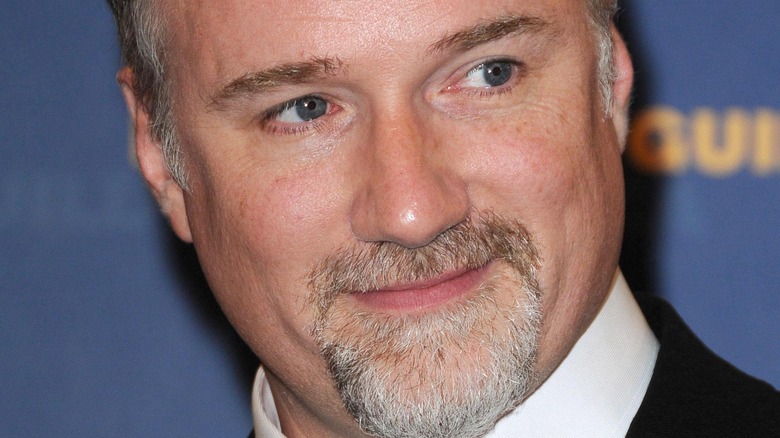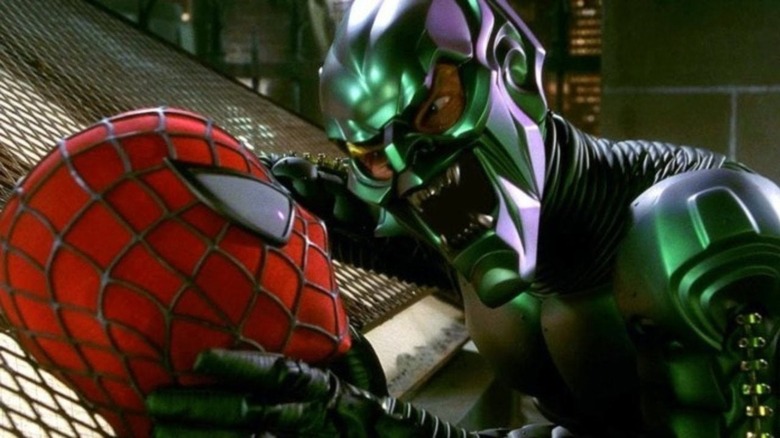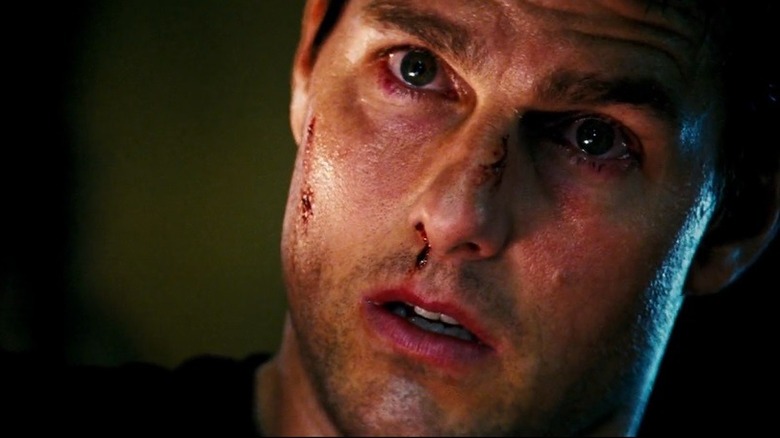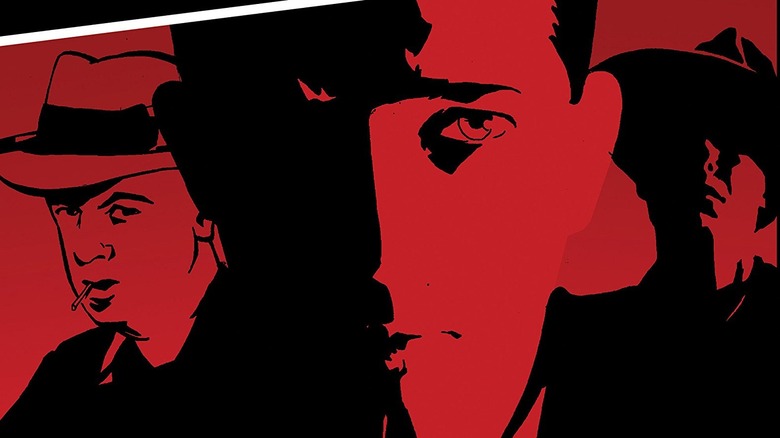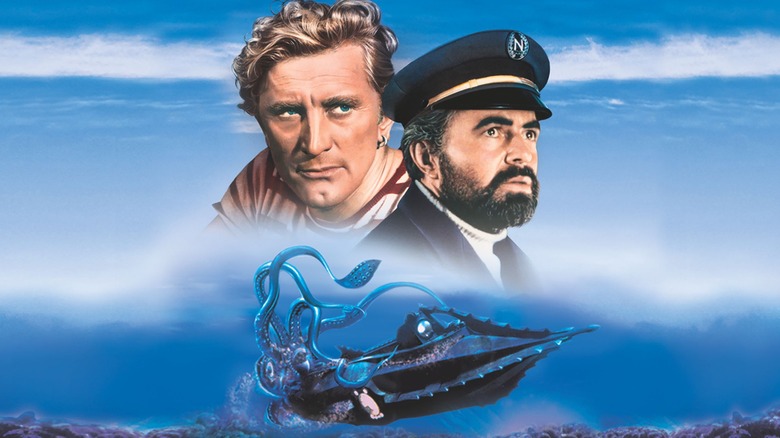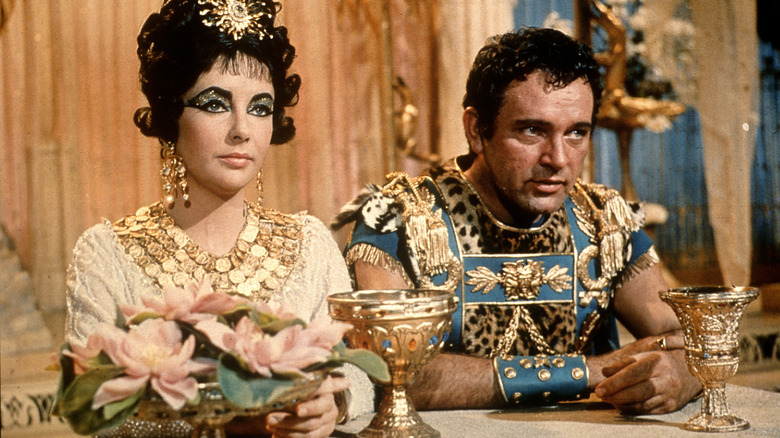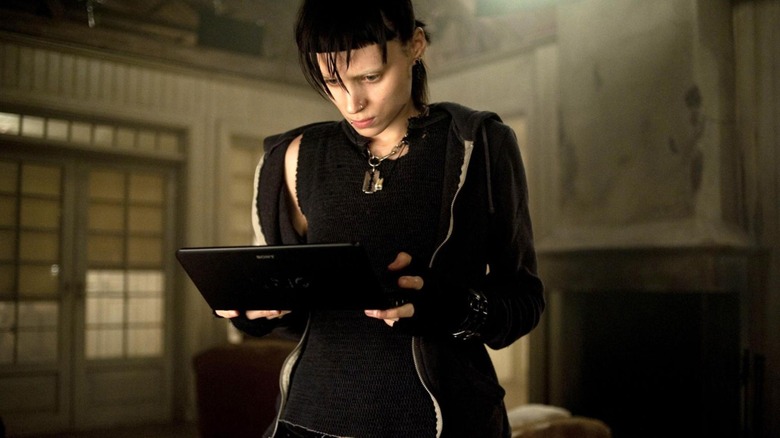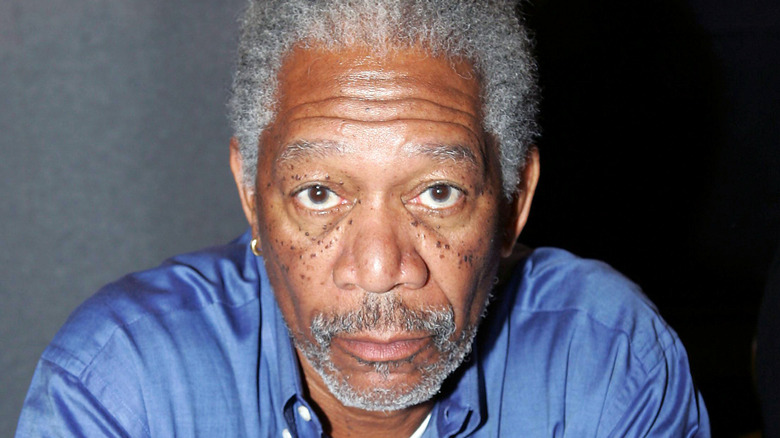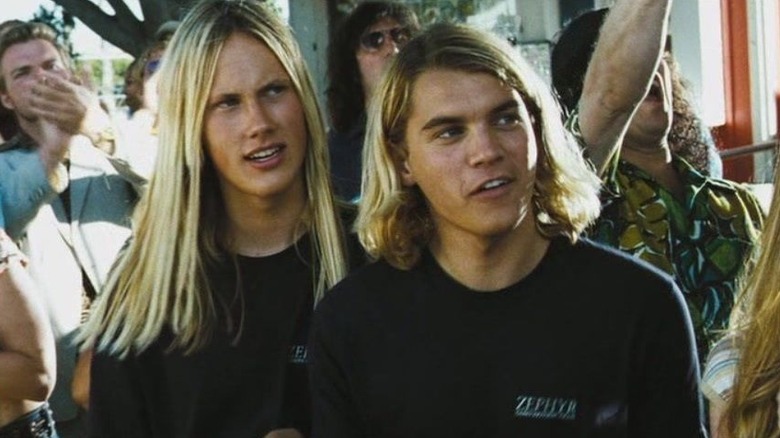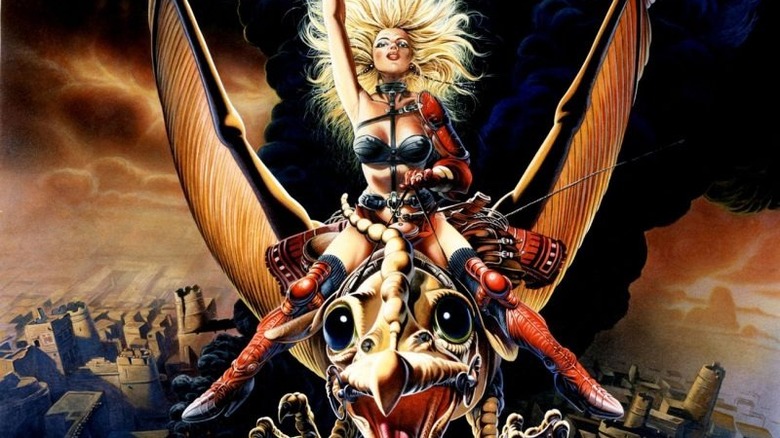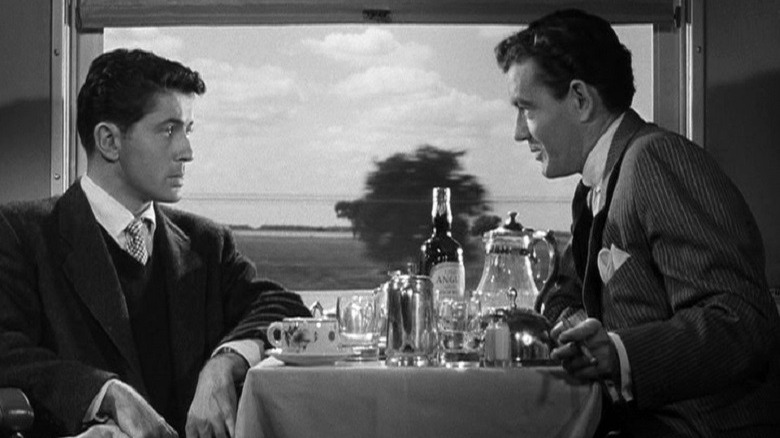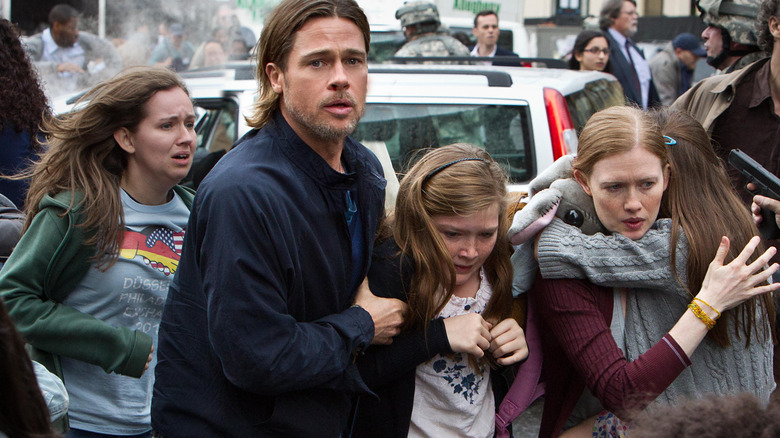David Fincher Movies We'll Never Get To See
Given how provocative so many of his movies are, it's a wonder director David Fincher has ever gotten anything made at a major studio. In bringing titles like "Se7en," "Fight Club," and "Gone Girl" to life, Fincher has inspired a fair amount of criticism but also an even greater heaping of praise for the bold choices his movies make. Fincher's works don't just deliver twists — they deliver moments that force you to grip your seat, grit your teeth, and gird your soul. They don't just leave you thinking, they leave you reexamining the entire world around you. Not every Fincher movie may be your cup of tea. But each of his features, particularly all-time classics like "Zodiac" and "The Social Network," are bound to leave some kind of impression on your psyche.
Fincher's creative tendencies are so bold that even his unmade movies tickle the imagination. Over the years, Fincher has been attached to a slew of projects that never got off the ground for a variety of reasons. Perhaps the budget wasn't right, or perhaps movie studio politics got in the way of Fincher's ambitions. Whatever the reasons, the David Fincher movies we'll never see still entrance the mind with the possibilities of what the filmmaker could've delivered if fate had been on his side.
Spider-Man
Looking over David Fincher's filmography, there's little there to suggest he'd be the optimal person to direct a superhero film. But he came close to doing just that with 2002's "Spider-Man." Fincher pitched his concept for doing the production to the project's producers and, as you'd expect for Fincher, it was radically different from the crowd-pleaser that was eventually released.
"I was never interested in the genesis story. I couldn't get past a guy getting bit by a red and blue spider. It was just a problem," Fincher explained (via Gizmodo) in December 2011. "I wanted to start with Gwen Stacy and the Green Goblin, and I wanted to kill Gwen Stacy. The title sequence of the movie that I was going to do was going to be a 10 minute — basically a music video, an opera, which was going to be the one shot that took you through the entire Peter Parker [backstory]."
No other details about Fincher's pitch, including what villains Spidey would've encountered throughout the rest of the movie, have ever been divulged. Of course, Sam Raimi got this particular gig instead of David Fincher, robbing the world of the chance to see what off-kilter ideas Fincher would've injected into this superhero feature.
Mission: Impossible III
After directing several striking movies in the 1990s, it appeared, at the dawn of the 21st century, that David Fincher was about to hit the big time. Word broke in 2002 that the director would be graduating to blockbuster filmmaking by taking on "Mission: Impossible III." Apparently, star Tom Cruise was integral in getting Fincher the job, and the production was aiming for a summer 2004 debut. At the time of signing on, Fincher was optimistic about delivering something memorable. "You can never make exactly the movie you want to make," he told The Guardian. "But if [Paramount] let us do even half of what we want, it should make for a pretty interesting film.
However, Fincher would soon leave the project, with Joe Carnahan signing on before eventual final director J.J. Abrams succeeded him as the man behind "Mission: Impossible III." In 2008, Fincher reflected on why exactly he departed the big-budget production. "I think the problem with third movies is the people who are financing them are experts on how they should be made and what they should be," Fincher explained to MTV. "At that point, when you own a franchise like that, you want to get rid of any extraneous opinions. I'm not the kind of person who says, 'Let's see the last two, I see what you're going for.' You'll never hear me say, 'Whatever is easiest for you.'" Because of these disagreements, when it came time to choose to accept directorial duties on "Mission: Impossible III," Fincher simply walked away.
Torso
"Torso" is a famous graphic novel based on the real-life serial killer known as the Cleveland Torso Murderer. Naturally, David Fincher, the master of modern movies concerning serial killers, was on board to helm a film adaptation of the material. However, fans of the original text by Brian Michael Bendis would need to prepare themselves for a radical reimagining of the work. ""Not to take anything away from Bendis, who did an amazing thing, but it's a pretty complete reimagining of it," Fincher explained to MTV in December 2008, adding, "It's not a linear chronology. It's more like 'Rashomon' or 'Citizen Kane.' It's an exploded version of it."
Shortly after those comments were made, Paramount Pictures dumped "Torso," putting the project on the backburner. Months later, it was revealed that Fincher had reportedly assembled a star-studded cast for the production that included everyone from Matt Damon to Rachel McAdams to Gary Oldman, and the script itself had apparently been penned by Ehren Kruger ("The Ring," "Scream 3"). Still, the creators of the comic expressed hope the film adaptation would have a chance to make it to the big screen. Despite such optimistic comments, since then, there have been no further updates on "Torso."
20,000 Leagues Under the Sea
When you think David Fincher, you might not automatically think of the kind of movies that Disney produces. But Fincher and the Mouse House almost joined forces for a new take on "20,000 Leagues Under the Sea." A modern adaptation of the story that inspired Disney's 1954 live-action movie, the film apparently would've been decidedly from the mind behind "Fight Club." Disney's president of production, Sean Bailey, said in 2010 (via MTV) that, "It's a bold, you know, Fincher-esque take. It's a bold, aggressive. ... It's got some of the characters from the original. It's got Land, it's got Aronnax. It's got Nemo, of course. But it's kind of a bold way in."
Three years later, though, Fincher's "Leagues" sank to the bottom of the ocean, as word came out that the project was officially docked. A year after that, Fincher got open about the fights that led to the film's demise, including his desire for Channing Tatum to headline the feature while Disney wanted Chris Hemsworth in the lead. "You get over $200 million — all motion picture companies have corporate culture and corporate anxieties," Fincher explained (via IndieWire). "Once we got past the list of people we could cast as the different characters in the film, once we got past one or two names which made them very comfortable, making a movie at that price, it became this bizarre endeavor to find which three names you could rub together to make platinum."
Cleopatra
At the start of the 2010s, an enticing project came up at Sony — a David Fincher film about Cleopatra starring Angelina Jolie. While an earlier movie about that mythic figure starring Elizabeth Taylor had been an infamous train wreck, the thought of putting a seasoned auteur like Fincher in the driver's seat seemed like a good way from preventing more behind-the-scenes headaches. Plus, it was a project that would take Fincher into new territory since he'd never done an epic swords-and-sandal picture before. The possibilities of such a distinctive filmmaker embracing this genre were limitless.
For his part, Fincher was attracted to the project for reasons that went beyond visual effects. "We've seen scope; everyone knows we can fake that," Fincher said (via IndieWire) in December 2011. "That stuff doesn't impress in the way that it did even 10 years ago. We expect that from cable. So that's not the reason to do that." Instead, Fincher was more interested in a particular question: "What is it about this character that has purchased this place in our history and imagination that is relatable today?"
However, it wouldn't be long before Fincher dropped out of the production, with no concrete reason given for why the filmmaker suddenly lost interest in the endeavor. At the time of Fincher's departure, Sony was looking for a new person to direct Jolie in this "Cleopatra" project, with names like Ang Lee, James Cameron, and Denis Villenueve floated as a potential candidate to take over. However, it looks like Paramount will beat Sony to the punch with a Cleopatra flick from Patty Jenkins and Gal Gadot.
The Girl Who Played with Fire
"The Girl with the Dragon Tattoo" is not a one-and-done book nor was its Swedish film adaptation. Both properties were followed up by a pair of sequels — "The Girl Who Played with Fire" and "The Girl Who Kicked the Hornet's Nest." And the thought of doing more Lisbeth Salander adventures with David Fincher's take on "Dragon Tattoo" had clearly crossed the filmmaker's mind.
In December 2011, as his "Tattoo" film was about to be released, Fincher detailed plans to shoot adaptations of the two sequels back-to-back. "The second two books are very much one story," Fincher explained (via Collider). And it doesn't seem prudent to me to go to Sweden for a year. Come back for a year. Put out the second one. Go to Sweden for a year. Come back for a year. ... So I think that would be crazy especially given the sense that it's really one story that's kind of bifurcated in the middle."
However, by August 2012, initial plans to have Fincher's "Girl Who Played with Fire" out in theaters in 2013 were scuttled despite a draft of the script being written by Steven Zaillian ("Schindler's List," "The Irishman," and Fincher's "Girl with the Dragon Tattoo"). Though there were initial hopes of getting the production off the ground at a later date, these sequels were never meant to be. The project fizzled out after that, with Sony Pictures eventually electing to go the reboot route by doing a new Fincher-less version of Salander with 2018's "The Girl in the Spider's Web."
Rendezvous with Rama
Arthur C. Clarke's book "Rendezvous with Rama" is an influential text that would require some real creativity to get properly adapted to the big screen. Enter David Fincher, who had ambitions to helm an adaptation of the text, complete with "Se7en" lead Morgan Freeman on board as one of the main characters. By October 2008, Fincher had become pessimistic about the project ever happening. "It looks like it's not going to happen," Fincher said (via The Playlist). "There's no script, and as you know, [Morgan Freeman] is not in the best of health right now. We've been trying to do it, but it's probably not going to happen."
As the years went by, the production would keep coming up in conversations with Fincher, and the filmmaker would repeatedly note his desire to do the project but also his belief that it would never actually happen. "So there have been people that have been interested in this idea, and we have never been able to get a script," Fincher said (via /Film) in December 2010. "So the answer is, you know, is the story good enough, is the script the best telling of the story, is there an undeniable person to hang it on, is it technologically feasible. All those things come into play." Given that "Rendezvous with Rama" still hasn't happened more than a decade later, it appears the search for a filmable script continues on.
Lords of Dogtown
While most film fans know about 2005's "Lords of Dogtown," more obscure is the fact that David Fincher was once going to helm the production. When the film's original director, Fred Durst, bounced off the project, Fincher was hired to replace him. Fincher's version of the motion picture actually got quite far along in production. However, Fincher would eventually depart the film, and Catherine Hardwicke ended up being the one who directed the cut of "Lords of Dogtown" that graced theater screens.
So, what happened? According to a Seattle Times interview with Hardwicke, Fincher and "Dogtown" distributor Sony Pictures clashed over the cost and underlying ideas in the film. This led to disagreements that couldn't be resolved and inspired Fincher to abandon "Dogtown." And according to a Paste review of the film's final cut, one of Fincher's ideas that led to his parting was his desire to use real skateboarders in the movie rather than actors. That would've been an extremely bold move fitting of an ambitious filmmaker like Fincher, but it apparently wasn't the road Sony wanted to go down.
Heavy Metal
The original "Heavy Metal" is one of the most influential animated movies of all time, a last hurrah for theatrical American animation aimed at grown-ups after the subgenre's 1970s heyday. It proved so influential that it was bound to one day get a remake. Turns out, David Fincher was the one who wanted to bring "Heavy Metal" to the modern era. This incarnation of the project would have segments directed by everyone from Fincher to Gore Verbinski to Zack Snyder, among many others.
Of course, it's very difficult to get adult-skewing animation made on a feature film level, and Fincher's "Heavy Metal" quickly got stuck in trouble. Paramount Pictures eventually dropped the project and sent it into limbo. Fincher and company tried shopping the production around, including with a 2010 incarnation that apparently had James Cameron on board to direct a segment. Despite garnering the participation of Cameron shortly after "Avatar" made box office history, it still wasn't enough to get financiers interested in an R-rated animated movie, even one using the "Heavy Metal" brand name.
In the end, this iteration of the "Heavy Metal" remake was never meant to be. However, that doesn't mean this unmade feature didn't have a broader impact on Fincher's career. On the contrary, it helped inspire Fincher and Tim Miller, the two architects behind this would-be "Heavy Metal" remake, to pursue a new animated anthology project for Netflix entitled "Love, Death & Robots."
Strangers on a Train
David Fincher's 2014 movie "Gone Girl" proved to be not just a critical success, it also turned out to be a moneymaker at the worldwide box office. This colossal hit was thanks to a fantastic collaboration between Fincher, star Ben Affleck, and screenwriter Gillian Flynn. Everyone worked so well together on the thriller that it's understandable why this trio would be looking around for further projects to team up on.
Just a few months after "Gone Girl" hit theaters, news broke that this group would be reuniting for a remake of the Alfred Hitchcock 1951 film "Strangers on a Train." In the original movie, a tennis player (Farley Granger) meets a wealthy sociopath (Robert Walker) aboard a train, and after what's supposedly a light-hearted conversation, the psycho thinks they've made a deal to swap murders — the tennis player's wife for the bad guy's dad.
This version of the story, though, would be called "Strangers," would be set in the modern times, and focus on Affleck playing a famous movie star rather than a tennis pro. Upon the film's announcement, it was noted that it was hurling towards production at great speed. Despite that initial momentum, not to mention the enticing combination of the Fincher-Affleck-Flynn trio and a famous Hitchcock film, the production never materialized. Just a few months after it was announced, Flynn noted that "Strangers" was unlikely to happen in the near future due to the busy schedules of all involved parties. Her prediction ended up being dead-on, as "Strangers" has never managed to become a reality.
World War Z 2
In the wake of directing Best Picture nominees like "The Social Network" and becoming associated with top-notch thrillers aimed at grown-ups, David Fincher, at one point, was aiming to direct ... a sequel to the 2013 blockbuster "World War Z." A project that had long been in development at Paramount Pictures, Fincher approached the endeavor with a surprising amount of vigor. This production would reunite the auteur with "Fight Club" lead Brad Pitt and also allow him a chance to enter the realm of mega-budgeted blockbusters for the first time.
Surprisingly, the project didn't fall apart because Fincher suddenly lost interest. On the contrary, Fincher remained loyal to "World War Z 2" until the very end. Unfortunately, at the start of 2019, despite the director already looking around the world for places to shoot this blockbuster, Paramount Pictures decided to shelve "World War Z 2." Concerns over the movie's budget and especially its viability in key international markets like China ensured the productions doom. It was a tragic end for a project that could've been seen as a paycheck gig but that Fincher approached with extra levels of passion. Brad Pitt, for one, mourned the loss of Fincher's vision. "We had really good story, which he shepherded, really strong story," Pitt said (via CinemaBlend). "The things he had planned for it just hadn't been seen yet. I'm sure he'll get it out on something else."
